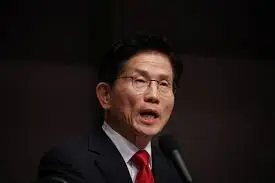South Korea presidential candidate Kim says open to discussing US troop cost

South Korea is preparing for a snap presidential election on June 3. One key issue in the race is the financial arrangement for U.S. troops stationed in the country. Kim Moon-soo, the conservative candidate from the People Power Party, has said he is open to revisiting South Korea’s financial contribution. He may support increasing the amount South Korea pays to host roughly 28,500 American troops.
Background: U.S. Troops in South Korea
The United States has maintained a military presence in South Korea since the Korean War armistice in 1953. These troops serve as a deterrent against potential aggression from North Korea. Currently, about 28,500 U.S. soldiers are stationed in South Korea.
To share costs, the two countries signed the Special Measures Agreement (SMA). This deal requires South Korea to pay a significant sum annually. The current agreement, signed in October, runs for five years. Under it, South Korea contributes about 1.52 trillion won (around $1.09 billion) each year.
Kim Moon-soo’s Position: Willing to Negotiate
Kim has taken a pragmatic stance on this issue. He stresses the importance of a strong security alliance with the United States. Kim acknowledges the vital role U.S. troops play in keeping the Korean Peninsula stable.
At the same time, he says South Korea should be ready to pay a fairer share of the costs. He suggests increasing South Korea’s contribution if needed to maintain the alliance’s strength. Kim did not give specific numbers but made clear he wants an open discussion.
This view partly aligns with previous U.S. demands. Under former President Donald Trump, the U.S. pushed its allies to pay more for their defense. Trump also tied military spending to trade talks, demanding better deals for the U.S.
Government’s Official Stance and Public Opinion
Despite Kim’s openness, South Korea’s government insists the current SMA is final. Officials say cost-sharing should not become a bargaining tool in other negotiations. They want to keep defense agreements stable to avoid encouraging North Korean threats.
South Korean public opinion is mixed. Many citizens value the protection the U.S. military provides. But there are concerns about the costs and side effects. Issues like noise pollution and accidents involving U.S. troops have sparked debate. Many wonder if South Korea’s financial burden is fair.
The Geopolitical Context
Kim’s views come amid growing regional tensions. North Korea continues its nuclear weapons program and missile tests. Meanwhile, China’s rise challenges U.S. influence in the Asia-Pacific. This creates a complex environment for South Korea’s foreign policy.
Kim’s main rival, Lee Jae-myung of the Democratic Party, offers a different approach. Lee favors a balanced foreign policy. He supports pragmatic engagement with China and Russia while keeping ties with the U.S. and Japan. Lee warns against deep involvement in U.S.-China disputes. This position has drawn criticism from conservatives who see it as too soft on China.
This debate reflects South Korea’s dilemma. The country must weigh security, economic interests, and diplomacy carefully.
Election Impact: Defense and Economy in Focus
The snap election followed the removal of former President Yoon Suk Yeol. Yoon faced backlash for his attempt to declare martial law last December. Security and economic issues are now at the forefront of voter concerns.
Kim’s readiness to revisit troop cost-sharing may attract voters focused on strong defense. His message appeals to conservatives who view the U.S. alliance as crucial for safety.
Lee’s pragmatic stance may win support from voters wary of rising military costs or tensions with China. Lee also criticizes Kim’s legal troubles, adding to the political contest.
The Road Ahead: Balancing Alliances and Costs
As the election draws near, the U.S.-South Korea alliance remains a key issue. Kim Moon-soo’s willingness to increase South Korea’s share could align with U.S. expectations. But it raises questions about domestic acceptance and economic impact.
South Korea faces a tough challenge. It must maintain credible defense against North Korea, keep strong U.S. ties, manage costs, and maintain good relations with China and Russia.
The election result will influence not only South Korea’s future but also the stability of the entire Asia-Pacific region.






